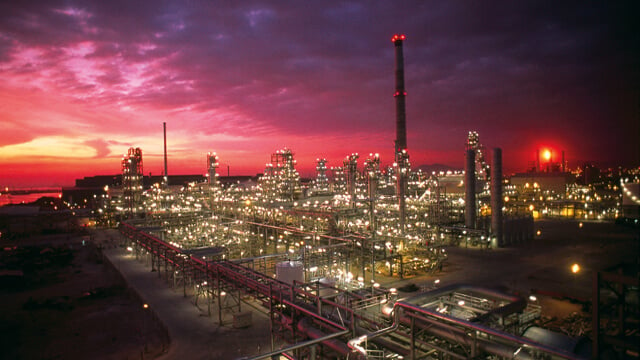Residuo de coke
Upgrading residues and heavy hydrocarbon fractions in order to produce more valuable products and feedstocks through coking requires highly reliable and efficient processes. For maximum uptime under the toughest conditions, rely on Alfa Laval heat exchangers for maximal run length and efficiency when recovering energy, condensing vapours or cooling hydrocarbon fractions produced in the process.
Optimizing refinery residue coking processes
Refinery residue coking processes call for smart energy efficient equipment that reduces maintenance costs, increases production and boosts profitability. Alfa Laval has the expertise, technology and services to meet refinery needs.
Increasing energy efficiency
Residue coking as a thermal cracking process operates at elevated temperatures of approximately 500°C. To minimize energy requirements, the feed is normally preheated to the highest possible temperature by means of heat recovery from the hot streams leaving the fractionator.
Traditional shell-and-tube heat exchangers operating for such services normally require very large, bulky units , which result in low velocities and high-fouling tendencies. This limits the amount of energy that can be recovered, therefore requiring higher energy input through the fired heater.
High-efficiency Alfa Laval heat exchangers maximize energy recovery while minimizing the number and size of the heat exchangers required for this service. This minimizes the energy input required for the final preheating. In addition, the low-fouling tendency of Alfa Laval heat exchangers ensures that energy efficiency is always at the highest possible level.
Mitigating fouling in refinery coking processes
Preheating heavy hydrocarbon fractions and residue streams to the highest possible temperature prior to the fired heaters can cause severe fouling. This is especially true when using the bottom streams from the fractionator or coker slurry as the heating media.
Bottom streams from the fractionator often contain a lot of particles from the coker process, and high solids content is even more of an issue when using coker slurry as the heating media. Fouling tendency on the feed side depends on the stability of the residue as well as the contents of fouling precursors such as iron oxides.
Traditional shell-and-tube heat exchangers operating in this service normally suffer from severe fouling and plugging problems. These problems can be so severe, they limit the capacity of the entire plant, causing cleaning costs to sky-rocket.
Low-fouling Alfa Laval spiral heat exchangers minimize the fouling tendency through controlled channel velocities and low hold-up time. This means that there are no limitations to the process throughput. Moreover, when cleaning is required, the downtime and cost is minimized due to easy access to the heat transfer channels.
Boosting CAPEX savings in refinery coking processes
Tradtional shell-and-tube heat exchangers can become expensive, espcially when requiring several large, bulky exchangers in series to recover energy or when installation on construction is needed to condense vapours. With compact, high-efficiency Alfa Laval heat exchangers, it is possible to reduce investment and installation costs significantly while using minimal plot space and flooded weight.
Proven technology for refinery residue coking processes
In residue coking plants around the world, Alfa Laval has close to 50 heat exchangers operatinge as interchangers, vapour condensers and slurry coolers. These provide significant savings in capital expenditures as well as energy and maintenance costs, thereby boosting the bottom line.

